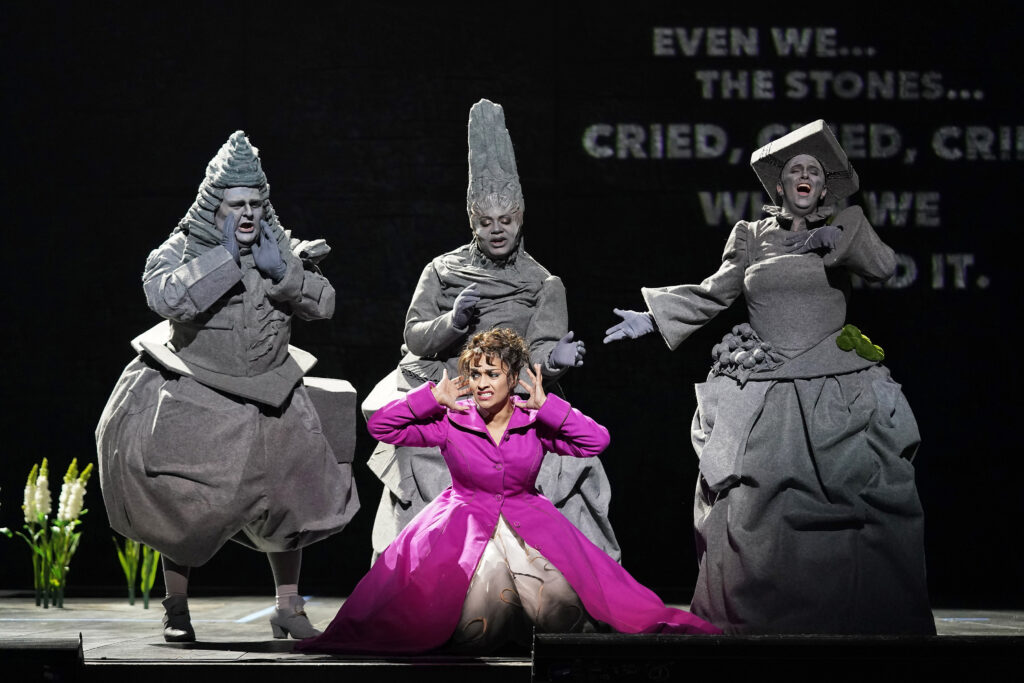
Feb. 1 was an electric night for LA Opera as it brought the highly anticipated world premiere of Matthew Aucoin’s “Eurydice.” You never know what to expect from a world premiere. You certainly don’t expect it to be across-the-board fantastic. But “Eurydice” was! The music, the libretto, the singers, the characters, the scenery, the costumes — everything came together in a very clever and immensely fun new opera for the ages. It travels to the Met next.
Perhaps we shouldn’t have expected any less from three “geniuses.” Composer Aucoin, LA Opera’s first artist-in-residence, librettist Sarah Ruhl and director Mary Zimmerman have all earned a prestigious MacArthur Fellowship.
Ruhl’s libretto is based on her play of the same name. Her writing is exquisite and thought-provoking but also laugh-out-loud funny and surreal. The story takes the point of view of Eurydice, who in the Greek myth loses her chance to leave the Underworld when her husband Orpheus breaks Hades’ one rule: he can’t look back at her as they leave.
With Ruhl’s words and Aucoin’s music, the characters are wonderfully drawn. Aucoin divides Orpheus into two singers because he is described in the myth as both human and superhuman (in his musical abilities). Aucoin said in his note: “The baritone is Orpheus as a human being; when he’s behaving more or less normally, only the baritone sings. But when he goes into his musical trance, or shows flashes of his superhuman ability, he is joined by his Double, a countertenor.” A clever musical touch.
Some of the characters are particularly entertaining, like the three Stones, who are the rule enforcers of the Underworld acting as a Greek Chorus. The ruler of the Underworld, Hades is, in Aucoin’s words, an “absurd” villain who doesn’t succeed at blending in with humans. Rather than give him a typical bass voice, Aucoin chose an extremely high tenor; and Hades’ costume is an outrageous bright green plaid suit. When he tricks Eurydice into leaving her wedding reception to go to his penthouse apartment where he has a letter from her recently deceased father, she innocently goes along. It’s uncomfortably creepy because Hades is portrayed as a Harvey Weinstein-like “businessman” (a perception I later found confirmed by Ruhl in a recording of the pre-show lecture).
The singers did an amazing job working with the “geniuses” to develop these new roles. Standouts included Danielle de Niese (Eurydice), a 1995 Music Center Spotlight Award winner and the youngest to be accepted to the Met’s Lindemann Young Artist Program; Rod Gilfry (Eurydice’s father), a two-time Grammy nominee with 80 roles under his belt; and Barry Banks (Hades), who has performed in Bellini, Rossini and Donizetti operas on the world’s best stages.
Aucoin’s music is lush, gorgeous and heart-pumping. I love how he described it in his note: “There is an ‘Alice in Wonderland’-esque sense of the absurd in ‘Eurydice,’ especially in the sections featuring Hades and the Stones. This aspect of the story was endlessly fun to set to music. Opera is surreal and anti-realistic by its very nature, and if you embrace its absurdity, you can unleash some really wild energies.” Aucoin conducted with a wild energy to match the notes on the page.
Some of the beauty of “Eurydice” is in the details: the dancing at the wedding reception, the sand (from the first beach scene) Eurydice finds in her pockets in the Underworld after her second death, the elevators that travel between the Underworld and the land of the living, the wedding vows about each person being a book (“How does a book read another book?”). At one point the Stones cry, and tiny stones drop onto the stage where the dead (awful creatures with bandaged mouths) scoop them up.
The “Romeo and Juliet”-like ending is heartbreaking, but it’s perfect. It drives home a theme of “Eurydice,” that love and suffering are two sides of the same coin. When the pain is too much and Eurydice and her father choose to wash away their memories in the Underworld’s River of Forgetfulness, they also lose the memory of love and, with it, a reason to live.
—Julie Riggott, Culture Spot LA
“Eurydice” continues with five more performances through Feb. 23 at the Dorothy Chandler Pavilion. Visit https://www.laopera.org/performances/201920-season/eurydice/.
Find details about the Eurydice Found Festival post-performance events at: https://www.laopera.org/community/eurydice-found/eurydice-found-events/





